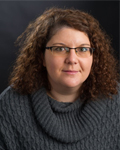
Elisa Floriddia, postdoc at the Karolinska Institute (KI) in Sweden and member of SfN's Professional Development Committee (PDC), reflects on ways extracurricular leadership opportunities have enriched her career. As chair of her institution's postdoc association, she rallied peers together to bring awareness to common issues postdocs face and gained professional confidence. Read about her experience and learn from her advice to other postdocs.
Can you walk through your career path so far?
I'm from Italy, where I did my undergraduate and graduate training. During my Master's program, I had a fantastic mentor who advised trainees to go after the science we wanted to do. My mentor also emphasized how valuable it is to change countries, which gave me the courage to seek PhD training opportunities elsewhere in Europe.
I ended up moving to Germany which were fantastic years, science-wise. Along the way, I had questions about how to get to the next step in my career path. My PhD adviser suggested I become a member of SfN and then I could access the online content, which I found very useful.
I decided I wanted to continue in an academic path after I graduated, so I pursued postdoctoral training and am now in my second postdoc appointment at the Karolinska Institute (KI) in Sweden.
What led you to get involved in your postdoc association?
Over the years, I developed an interest in leadership, management, and advocacy. I then learned about my postdoc association and how it’s trying to change postdoctoral training, which can often feel like uncharted territory.
I joined the association (and eventually became chair) to help make the training process clearer so postdocs, like me, can walk through these years knowing what we're doing will lead to accomplishing our goals.
The mission of the KI postdoc association is to give postdocs a voice. We focus on what defines a postdoc position, what postdoctoral training should entail, and how long should it be. We also address how to give postdocs representation and facilitate career transitions.
What has your involvement been like and what impacts have you seen on the field?
There is a lot of peer-to-peer support. We identify important issues and take joint action for the benefit of our association’s members and the postdoctoral community at-large.
One issue we face is the lack of clarity around what skills we're supposed to acquire during our postdoc to continue in academia or transition to a non-academic career path. So, we worked as a team for more than a year on a potential postdoc training program, resulting in an institutional decision-maker being open to implementing some of our ideas.
Another issue is a bit Swedish-specific. In Sweden, the path to becoming an assistant professor changed, which then changed the eligibility criteria.
Now, you only have five years in a postdoc position to build a CV and gain enough independence to transition to the next step. We’re at a medical university, where five years in biomedical research isn’t long enough to accomplish that.
So, we collected data and wrote reports showing the timeframe isn’t matching reality. The motion wasn’t taken, but we made the national and international community aware of it and received a good response from our peers.
How has your involvement in the postdoc association and on PDC impacted your career?
Both opportunities improved my ability to speak up. They have made me more comfortable and given me confidence because I’m surrounded by like-minded people who share my ideas about what should be a priority.
Chairing the postdoc association was especially enriching because it was the first time I had to coordinate a big group of people. As a postdoc, you typically work with students, but informally, and usually only one at a time. In this case, I had to run a program with multiple priorities and coordinate 20 volunteers. The experience gave me confidence that I can lead many people.
What advice do you have for postdocs?
Be proactive. Don’t wait for other people to take care of your needs.
Talk to other postdocs and start your own postdoc group. If you want to host a career event, self-organize a group, put together an event plan, and propose it to your dean.
I’d also advise postdocs to be strategic and plan in advance. Nothing happens by chance and it usually takes longer than expected.
Join a postdoc association or sign up for their newsletters to stay current on important professional development opportunities. Figure out what you want to do and check in to see if you’re taking action to reach those goals.
Speaker






